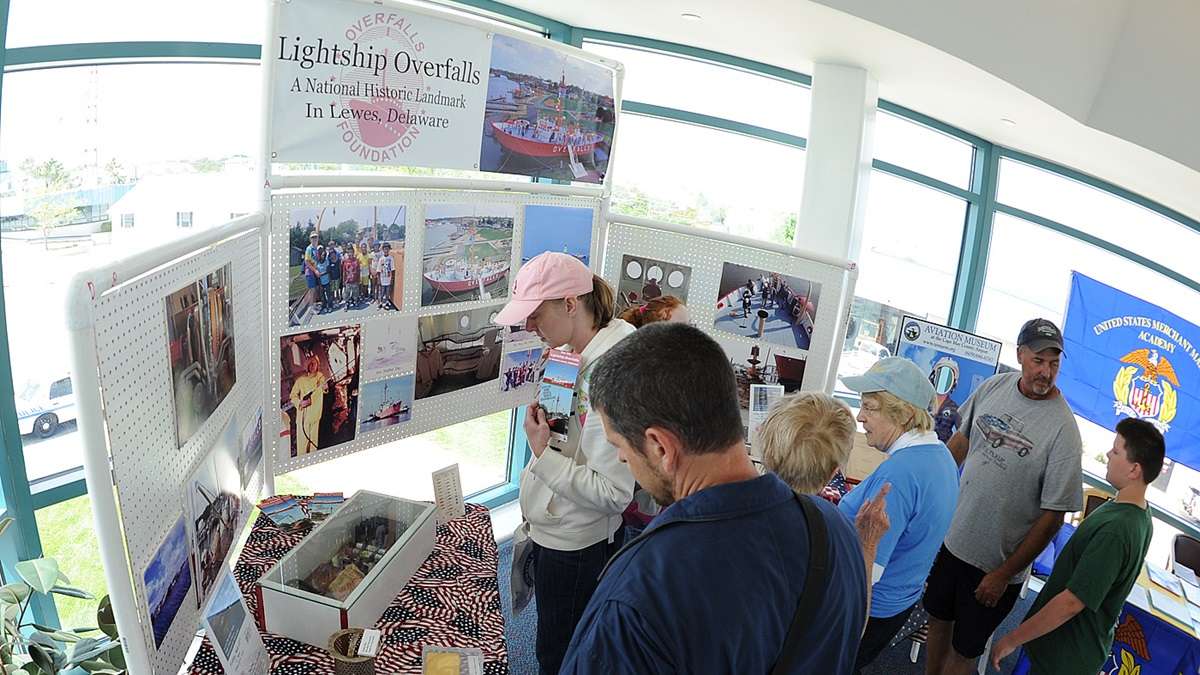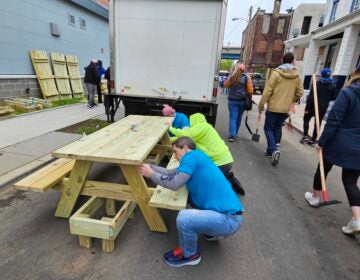Granny Peace Brigade honors nonagenarian anti-war activists
Members of the Granny Peace Brigade call 95-year-old Goldie Freedman Petkov a “Red Diaper Baby.”
Born in Philadelphia to active Communists, Petkov marched for multiple labor and civil-rights causes throughout her adolescence, including those of the Scottsboro Boys, the Russian War relief and the unionization of steel workers.
Petkov’s family owned a pharmacy where she worked after earning her B.A. degree from the Philadelphia College of Pharmacy Science. Among its visitors were FBI agents who asked the family’s neighbors if black people, or any large groups of people, visited the Petkov’s home.
That back story is why, on Sunday afternoon at Rittenhouse Square’s Ethical Society, Philadelphia’s chapter of the Granny Peace Brigade honored Petkov and five advocates over the age of 90 for their lifetimes of activism.
The group’s formation
The Philadelphia Granny Peace Brigade started in the spring of 2006 when a group of acquaintances met to discuss their concerns about the Iraq War.
Deciding to call themselves Grandmothers for Peace, the women held an event in Rittenhouse Park to protest the government’s use of taxes to fund the war.
Granny Lois Durso says they were soon inspired by a story in New York about a Granny Peace Brigade that held a sit-in at a military recruiting office.
“As a result of that,” said Durso, “we decided to call ourselves Granny Peace Brigade Philadelphia.”
And so, on a mission of peaceful demonstration, 11 grannies (including famed poet Sonia Sanchez of Germantown) held a sit-in at the military recruiting center at Broad and Cherry streets, where they asked to enlist. When recruiters said no, they refused to leave the building.
Police arrested and charged them with defiant trespass; later that year, a judge threw the case out, citing the women’s right to non-violent protest.
The group’s post-arrest activities
The brigade has since supported the efforts of other groups like the Women’s International League.
Twice a month, a steady group of 12 to 15 women meets at the Friends Center to discuss how they might address social and political concerns.
A recurring topic has been the reintegration of troops into society.
The grannies have traveled to Harrisburg to speak to representatives about the extended tours of Pennsylvania National Guard units, and whether soldiers are getting necessary treatments when they arrive home.
They have protested drone strikes — most recently at a Saturday demonstration with other activist groups at Independence National Historic Park — and taken their concerns about high-school military recruiters to neighborhood fairs.
They’ve also knitted “stump socks” for amputees after asking the VA Medical Center about proper fits and preferred colors.
Honoring long-standing activism
Last fall, Granny Jean Haskell had an idea to honor the oldest members of the Granny Peace Brigade, four women and two honorary men, who have worked “for a peaceful world.”
“I thought, well, they might be dead soon, and it would be a shame not to get their stories down!” said Haskell.
In addition to Goldie Petkov, the “Telling Their Stories … A Celebration” event honored Evelyn Alloy, a former member of the Independent Youth League and the Young People’s Socialist League who marched on Girard College to allow black admission and organized anti-war rallies in the 1960s.
A member of the Women Strike for Peace, Alloy frequently participated in marches on Washington and was once arrested for civil disobedience at the Pentagon.
The program also highlighted the work of two couples: Jerome and Ruth Balter, and Pauline and Sherman Labovitz
Originally from New York City, Jerome and Ruth Balter supported school desegregation when they moved to Rochester, where they raised their family.
A former social worker, Ruth Balter is a co-founder of the Philadelphia Granny Peace Brigade and was one of those arrested at the recruiting center in 2006.
Jerome Balter, an environmental lawyer, worked to expose “a lack of protective regulations” in poor communities and forced Pennsylvania to require auto-emission testing.
Pauline Labovitz is the daughter of Russian Revolution immigrants. When police arrested her mother for soliciting signatures for a petition to abolish nuclear weapons, Labovitz successfully fought to have her released.
A few years later, police arrested her husband Sherman Labovitz, a lawyer and leader during the Civil Rights movement, functioning as an intermediary between the leaders of the progressive Jewish and the Black Power communities.
As a result of his activism during the McCarthy Era, Sherman Labovitz was arrested with eight others in Philadelphia under the Smith Act, a statute that criminalized those who “advocated” the “violent overthrow” of the government.
When no lawyer would represent the accused, Pauline Labovitz and the wives of other defendants fought to have the Philadelphia Bar Association assist their husbands. Each was ultimately exonerated.
How they were honored
In a crowded assembly room, attendees watched a video compilation featuring interviews with each honoree. Advocate and author Medea Benjamin then addressed the crowd.
Benjamin is the co-founder of CODEPINK: Women For Peace, a national social-justice movement that aims to channel military monies into education and other “life-affirming activities.”
“I am so moved by how you have been able to merge issues together,” Benjamin told the group. “It’s not just about one thing, like women’s rights. It’s about understanding that you don’t see the fruits of your labor in a short amount of time.”
Words from the honorees
Ruth Balter told NewsWorks that whenever she gets the chance to talk to young people, she encourages them to think about “social good” above individual ideals.
“I say, ‘Hey, It’s your world. You’ve got to pay attention,'” she said.
In a taped interview, Goldie Petkov said that she was once a part of the Young Communist League, and that she had never before publicly admitted her membership.
Now, at 95, her message is to observe and react.
“You can’t stop facing the fact that there is so much to be fixed!” she said with a grimace. “How can you just stand by and not participate in some way?”
WHYY is your source for fact-based, in-depth journalism and information. As a nonprofit organization, we rely on financial support from readers like you. Please give today.
























